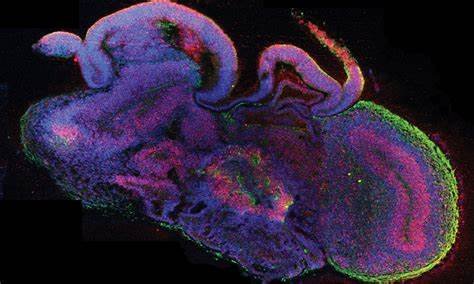ACROBiosystems Debuts 3D Organoid Solutions for Biotherapeutic Research
11 April 2024 | Thursday | News

Image Source : Public Domain
ACROBiosystems has been continuously rolling out a series of innovative organoid-related products. At a range of significant international events, including the 2024 International Organoid Summit, the Alzheimer's Research UK Conference 2024, and World Organoid Research Day 2024, the company showcased its advancements in the field with ACROBiosystems' Vice President of Corporate Development and Strategy, Rosanna Zhang, elucidating the strategic importance of organoids in practical applications.
ACROBiosystems' Organoid Portfolio
To propel organoid research, drug discovery, and therapeutic advancements, ACROBiosystems presents the Organoid Toolbox, the comprehensive suite of solutions designed to unlock the potential of organoids across diverse applications. This encompasses ready-to-use organoids, organoid differentiation kits, cytokines for organoid culture, matrix materials for organoid cultivation, organoid differentiation services, and compound testing services on organoids.
ACROBiosystems has successfully developed a multitude of organoids, including cardiac, cerebral, intestinal, liver organoids, along with toxicological evaluation models and disease models for Parkinson's, Alzheimer's, and inflammatory bowel disease. By leveraging its proprietary organoid research and development platform, the company is seeking to continuously expand its solutions by creating organoids like retina, skin, and lung; thereby broadening the scope of organoid applications. Through advanced in-house organoid differentiation and cryopreservation technologies, ACROBiosystems has achieved pivotal breakthroughs in organoids with conventionally challenging differentiation processes and long maturation periods, delivering highly efficient and user-friendly organoid solutions globally.
Adhering to ISO quality management certifications, GMP standards, and CNAS-accredited services, ACROBiosystems also ensures the consistency, purity, high activity, and batch-to-batch uniformity of its organoid products.
" As part of the life sciences community and an upstream supplier to the biopharmaceutical industry, it's imperative that we also support the effort in reducing animal testing," emphasized Rosanna Zhang, Vice President of Corporate Development and Strategy. "This is something that we consider a social responsibility. As a leading supplier of life science solutions, the ethical concerns behind animal testing are not something that can be disregarded. Following the '3R' principle on animal experimentation – replacement, reduction, and refinement – organoids are poised to be the best available replacement to reduce our reliance on animal models in disease research."
As ACROBiosystems continues to intensify its R&D investment and deepen collaborative relationships with global strategic partners, they also seek to broaden the applications and boundaries of organoid technologies. They aim to achieve critical breakthroughs in the development of diverse organotypic models for use in complex disease modeling and high-throughput drug screening. The company actively supports industrial applications of organoid technology, having forged partnerships with leading CROs, neuroscience entities, and cell therapy companies to collaborate on pioneering projects like constructing cardiac organoid-based toxicology assessment systems and precise AAV capsid screenings.
Organoids and its Industry Impact
Organoids are miniature organ-like structures composed of various cell types, mimicking the architecture and functionality of real organs. These are derived from stem cells or adult cells obtained from tissue samples, then cultivated under specific conditions involving growth factors that encourage self-organization into complex 3D structures representative of human physiology. Compared to traditional 2D cell cultures and animal models, organoids better simulate the intricate physiological environment and genetic background in humans, enabling more accurate studies of human development, disease mechanisms, drug discovery, and safety evaluations.
Most Read
- How Does GLP-1 Work?
- Innovations In Magnetic Resonance Imaging Introduced By United Imaging
- Management of Relapsed/Refractory Multiple Myeloma
- 2025 Drug Approvals, Decoded: What Every Biopharma Leader Needs to Know
- BioPharma Manufacturing Resilience: Lessons From Capacity Expansion and Supply Chain Resets from 2025
- APAC Biopharma Review 2025: Innovation, Investment, and Influence on the Global Stage
- Top 25 Biotech Innovations Redefining Health And Planet In 2025
- The New AI Gold Rush: Western Pharma’s Billion-Dollar Bet on Chinese Biotech
- Single-Use Systems Are Rewiring Biopharma Manufacturing
- The State of Biotech and Life Science Jobs in Asia Pacific – 2025
- Asia-Pacific Leads the Charge: Latest Global BioSupplier Technologies of 2025
- Invisible Threats, Visible Risks: How the Nitrosamine Crisis Reshaped Asia’s Pharmaceutical Quality Landscape
Bio Jobs
- Sanofi Turns The Page As Belén Garijo Steps In And Paul Hudson Steps Out
- Global Survey Reveals Nearly 40% of Employees Facing Fertility Challenges Consider Leaving Their Jobs
- BioMed X and AbbVie Begin Global Search for Bold Neuroscience Talent To Decode the Biology of Anhedonia
- Thermo Fisher Expands Bengaluru R&D Centre to Advance Antibody Innovation and Strengthen India’s Life Sciences Ecosystem
- Accord Plasma (Intas Group) Acquires Prothya Biosolutions to Expand Global Plasma Capabilities
- ACG Announces $200 Million Investment to Establish First U.S. Capsule Manufacturing Facility in Atlanta
- AstraZeneca Invests $4.5 Billion to Build Advanced Manufacturing Facility in Virginia, Expanding U.S. Medicine Production
News











